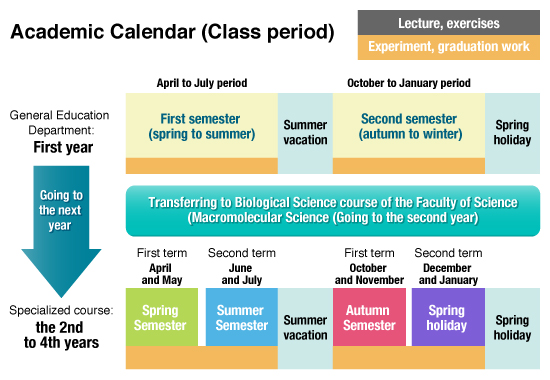The most advanced research environment and proficiency-oriented educational training
In the Biological Science course (Macromolecular Science and Engineering), in an enhanced, the most advanced research environment, about 50 faculty members and administrative staff teach 120 students, from 2nd year to 4th year, with great enthusiasm. We hope that our students will learn not just from lectures and experiments — we want them to enrich their knowledge by engaging in discussions with faculty members and seniors, through various events throughout the year, and broaden their overall academic perspective by communicating with their peers.
[Movie] Students’ planning: Laboratory Interviews: the most advanced research equipment, the introduction of the lesson and the like.リンクなし、ご指定ください
“Report submission every time” and “Learning support system”
At the lecture of this faculty, an assignment of submitting a report is given at every lesson. Some of them can be completed if students listen to the lecture, but some of them are difficult. Students have to find information in a library or ask seniors’ support. Any of the alumni says, “Submitting a report every time was very hard. But I think that helped me to strengthen my background.” We use the “NITOBE ePortfolio, Science version”, which is a system that supports learning in the specialized subject lessons. The system provides the features, for example, the teacher gives an assignment to students and students evaluate lessons, submit a report every time, post questions, and so on.

「Clicker」

In order to increase the proficiency of the lecture, we have introduced the Clicker as a communication tool for teachers and students. Students can answer questions by pressing the number button. Thus, their understanding level can be transmitted to the teacher immediately. (Appearance in the classroom)
Teaching Assistants (TA)
Teaching Assistants (TA) provide support for lectures. Along with the teachers, graduate students who have taken the TA training and were accepted as TA are responsible for the questions of the “every time report” and students’ laboratory practice assistance to raise the learning effect of undergraduate classes.
Specialized subject curriculum [Quarter system with four semesters]
The standard class period at Hokkaido University is based on the two-semester system, with the first semester (Spring to Summer) and the second semester (Autumn to Winter). In the course, we are promoting the class provision based on the quarter system with four semesters, [the first semester (Spring) (Summer) and the second semester (Autumn) (Winter)]. We are trying on improve the teaching system to promote students’ voluntary and active learning, including (1) offering intensive courses for effective learning, (2) ensuring sufficient time for laboratory practice (tutor teaching type), and (3) promoting voluntary research beyond the curriculum.

Second year
Providing lectures which nurture basic academic abilities and basic experiments.
Students are expected to learn basic experiment techniques for conducting research on biological macromolecule and life sciences fields, including the graduation research in the future.
Third year
Lectures are given in the morning. Students start their experiments including the developed contents in the afternoon.
Students will learn through group experiments. They are assigned to each laboratory in an early stage so that they can receive individual experiment guidance.
Fourth year
Finally, students will face the challenge of the training, including graduation research and paper reading, which are necessary as researchers.
They are assigned to each laboratory. Each student works on unknown research issues independently. Also, they read the most advanced research that has been introduced in the latest scientific journal. They receive training for presentation and discussion skills.
Those who want to enter graduate school (about 90% of them go to graduate school) will prepare for entrance exams and the students who want to find a job will be involved in the job-hunting process.